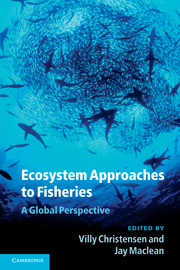Book contents
- Frontmatter
- Contents
- List of contributors
- Foreword
- Preface
- Acknowledgments
- 1 Introduction: toward ecosystem-based management of fisheries
- I Life in the oceans
- II Evaluating impact on marine life
- III Managing living resources
- IV The human side
- 13 Science and capacity building for sustainable development in fisheries
- 14 Thinking big on small-scale fisheries
- 15 Coastal-marine resource use in human ecological context: the scale and modes of integration
- 16 Global fisheries economic analysis
- V Impacting policy
- Index
- References
13 - Science and capacity building for sustainable development in fisheries
Published online by Cambridge University Press: 05 June 2012
- Frontmatter
- Contents
- List of contributors
- Foreword
- Preface
- Acknowledgments
- 1 Introduction: toward ecosystem-based management of fisheries
- I Life in the oceans
- II Evaluating impact on marine life
- III Managing living resources
- IV The human side
- 13 Science and capacity building for sustainable development in fisheries
- 14 Thinking big on small-scale fisheries
- 15 Coastal-marine resource use in human ecological context: the scale and modes of integration
- 16 Global fisheries economic analysis
- V Impacting policy
- Index
- References
Summary
INTRODUCTION
Over the past 40 years we have witnessed a major shift in the way marine science and related capacity building have been understood and approached both in industrialized and developing countries. In the early post-colonial days, marine science centers and universities in tropical and subtropical countries were mostly remnants of the former colonial powers and were strongly influenced by a logic of industrialization of the production process, similar to the green revolution in agriculture. This needed underpinning by resource assessments to bolster the associated investments.
Before World War II, fishery biologists like Baranov (1918; see also Chuenpagdee, this volume), Bückmann (1938), and Graham and coworkers (1939, 1943) had already developed the concept of optimal fishing based on the growth curves of populations and of individual fish. In the 1950s, Beverton and Holt (1957) turned those approaches into a widely accepted model of growth overfishing and maximum sustainable yield (MSY) in fisheries for North Sea plaice and haddock. In those species the risk of recruitment overfishing did not seem likely. Since 1956, the Food and Agriculture Organization of the United Nations (FAO) has held training courses in various developing regions to spread the Beverton and Holt approach. However, the single-species stock assessment developed for long-lived fish with clear age readings did not prove applicable to short-lived tropical fish and multispecies fisheries. Daniel Pauly was one of the first to develop indirect methods for age determination and stock assessments for those fish and fisheries (see Munro, this volume).
- Type
- Chapter
- Information
- Ecosystem Approaches to FisheriesA Global Perspective, pp. 209 - 225Publisher: Cambridge University PressPrint publication year: 2011



